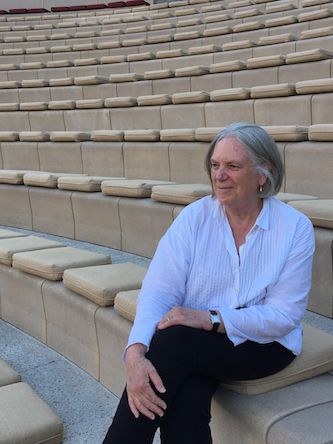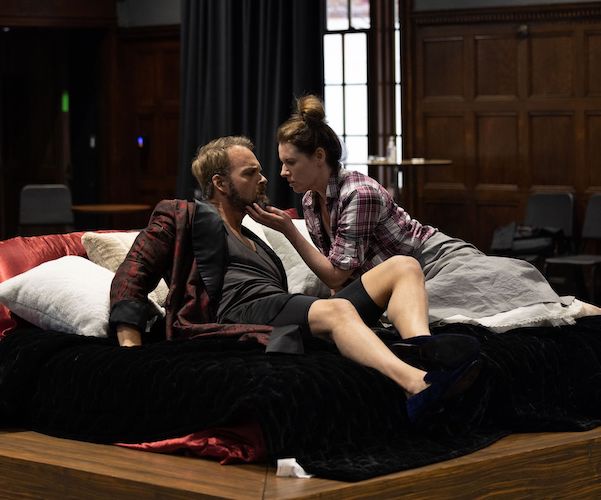Opera Interview: Director Anne Bogart Takes on “Bluebeard’s Castle/Four Songs”
By Robert Israel
“We take the audience on a journey that’s not part of a traditional approach to opera.”

Director Anne Bogart. Photo: Nana Dankin
The last time Anne Bogart directed in Boston was for the Boston Lyric Opera’s (BLO) 2019 production of Handmaid’s Tale. Previously, she directed her New York City–based theater troupe, SITI Company, in Trojan Women (After Euripides), at Arts Emerson’s Paramount Theater, which drew inspiration from the classic Greek text with an emphasis on the impact of humankind’s merciless waging of war. I lauded it as one of the best stage productions for 2013.
Bogart, 71, a Middletown, Rhode Island, native, returns to Boston on March 22 to direct Bluebeard’s Castle/Four Songs, again for BLO. It consists of a one-act opera composed in 1918 by Hungarian composer Béla Bartók, and four songs by Alma Mahler; it is scheduled for four performances through March 26. The show will be staged at The Terminal, Flynn Cruiseport, in South Boston, a venue previously named Black Falcon and known not as a performance space but rather as a hall where passengers climb onboard or disembark from deluxe cruise ships.
Arts Fuse caught up with Bogart for an interview during a break in rehearsal at the Huntington Theatre in Boston.
Arts Fuse: While writing my homage for this magazine about the late Adrian Hall, I recounted when we met at a show, a lifetime ago. We were seated at the Rhode Island School of Design auditorium in Providence, for a Project Discovery/Trinity Rep production of a Shakespeare play.
Anne Bogart: My first memory of seeing a professional theater production was there; it was Macbeth. That’s when I got bit by the theater bug. I was 15 years old. I was blown away. I remember thinking, “That’s what I want to do for the rest of my life.” And that’s what I’ve gone ahead and done. I’ve carried that experience with me ever since. It’s an impactful way of reaching an audience, it’s an immersive way of interpreting theater, and it leaves its mark on you. I was in London not long ago and I went to see Angels in America. It’s a long show with a lot of intermissions and I overheard two guys seated near me and it was clear to me from listening to their accents that they were from Rhode Island. And, they, like you and I, were Project Discovery kids. And I asked them what they remembered about those years. They said they remembered “the Bogart years.” And they said, “We loved the Bogart years!” They didn’t know who I was. After chuckling a bit, I said, “Well, I’m guilty as charged!”
AF: There are many legitimate performance spaces in Boston, so why was the Flynn Cruiseport chosen?
Bogart: The folks at BLO chose the site. I gave them an idea of what I was looking for, but they found it. When you walk into the venue downstairs at the terminal there’s an escalator with a big sign over it that reads, “To the Ship,” and I said, “I’m in!” It’s an incredible space, truly. I’m very excited about how it’s going to be used.
AF: So, as of this interview, you haven’t rehearsed in the venue yet?
Bogart: No, not yet. But I’ve seen what Sara Brown, the set designer, has come up with for the show, and it’s incredible what she’s done and how she’s envisioned how it all works. Nowadays, set designers use a computer program to sketch out how a set is going to be designed; they don’t just use pencils and paper. Sara took me through this incredible journey using the computer; it’s remarkable, really. She teaches at MIT, and let me tell you, it’s a brave new world. She’s working with Trinity Rep on a show in Providence as we speak. I can’t wait to see how it comes together.

Ryan McKinny and Naomi Lousia O’Connell in rehearsal for BLO’s production of Bluebeard’s Castle/Four Songs. Photo: Kathy Wittman
AF: When envisioning your work, your stage productions come to mind, productions that did not have a musical component. I’m thinking of the Brecht show you did at Trinity Rep years ago, how you took the audience behind the stage into the bowels of the theater. But there was no music involved. What’s your attraction to opera and its classical music roots?
Bogart: I just love all the dramatic aspects of opera and I love the music and the drama coming together and I’ve been directing operas for years. What’s not to love about it? It’s grand and glorious and it tells fantastic stories. Opera embraces extreme elements to tell these stories. In Bluebeard’s Castle, a predominately male story about Bluebeard and all his dead wives, we try to give it a distinctly female perspective. We take the audience on a journey that’s not part of a traditional approach to opera.
AF: What’s in store for you going forward? Last fall, the New York Times published a piece saying you were thinking of retiring from the theater.
Bogart: What I said to the reporter from the Times bears repeating. We started SITI Company 30 years ago to create a collaborative ensemble whose focus is not on real estate but on the plays they do. After 30 years, it’s time for new leadership and a young artistic director and the chance to offer a model for future young companies. So no, I’m not retiring. I am a professor of theater at Columbia University, and I intend to continue teaching there. What I’m doing is moving on to new projects, and I’ve got lots to look forward to, including seeing how this opera is going to play in Boston in a week or so.
Robert Israel, an Arts Fuse contributor since 2013, can be reached at risrael_97@yahoo.com.
Tagged: Anne Bogart, Bluebeard’s Castle/Four Songs, Boston-Lyric-Opera, Flynn Cruiseport
